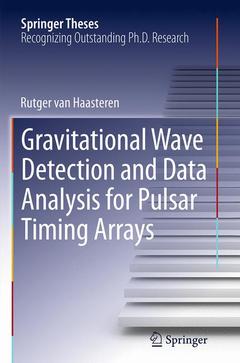Gravitational Wave Detection and Data Analysis for Pulsar Timing Arrays, Softcover reprint of the original 1st ed. 2014 Springer Theses Series
Auteur : van Haasteren Rutger

Pulsar timing is a promising method for detecting gravitational waves in the nano-Hertz band.
In his prize winning Ph.D. thesis Rutger van Haasteren deals with how one takes thousands of seemingly random timing residuals which are measured by pulsar observers, and extracts information about the presence and character of the gravitational waves in the nano-Hertz band that are washing over our Galaxy. The author presents a sophisticated mathematical algorithm that deals with this issue. His algorithm is probably the most well-developed of those that are currently in use in the Pulsar Timing Array community.
In chapter 3, the gravitational-wave memory effect is described. This is one of the first descriptions of this interesting effect in relation with pulsar timing, which may become observable in future Pulsar Timing Array projects.
The last part of the work is dedicated to an effort to combine the European pulsar timing data sets in order to search for gravitational waves. This study has placed the most stringent limit to date on the intensity of gravitational waves that are produced by pairs of supermassive black holes dancing around each other in distant galaxies, as well as those that may be produced by vibrating cosmic strings.
Rutger van Haasteren has won the 2011 GWIC Thesis Prize of the Gravitational Wave International Community for his innovative work in various directions of the search for gravitational waves by pulsar timing. The work is presented in this Ph.D. thesis.
Presents innovative research in search for gravitational waves by pulsar timing
Nominated by the Gravitational Wave International Committee as an outstanding Ph.D. thesis
Winner of 2011 Gravitational Wave International Community (GWIC) thesis prize
Includes supplementary material: sn.pub/extras
Date de parution : 08-2016
Ouvrage de 139 p.
15.5x23.5 cm
Disponible chez l'éditeur (délai d'approvisionnement : 15 jours).
Prix indicatif 52,74 €
Ajouter au panierDate de parution : 09-2013
Ouvrage de 139 p.
15.5x23.5 cm
Disponible chez l'éditeur (délai d'approvisionnement : 15 jours).
Prix indicatif 52,74 €
Ajouter au panierThèmes de Gravitational Wave Detection and Data Analysis for... :
Mots-clés :
2011 GWIC Thesis Prize Winner; Bayesian Analysis of Pulsar Timing; Data Analysis Algorithms; Gravitational Wave Detection; Gravitational Wave Memory; Pulsar Timing Arrays; Pulsar Timing Residuals; Springer Thesis Astronomy; Tests of General Relativity with Pulsar Timing; nano-Hertz Gravitational Waves



